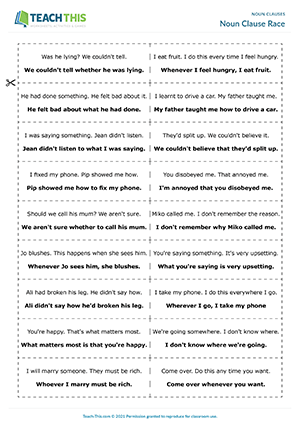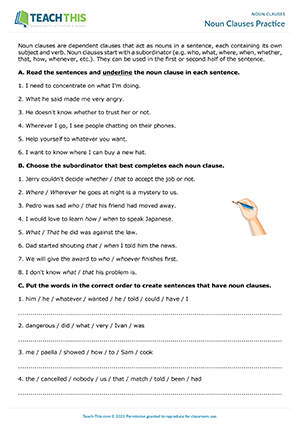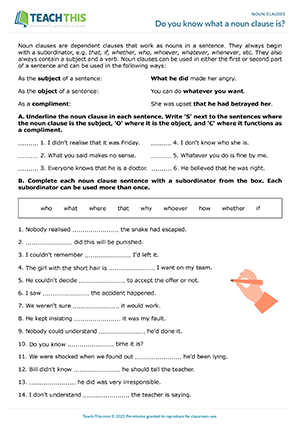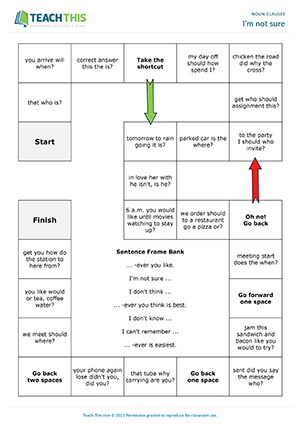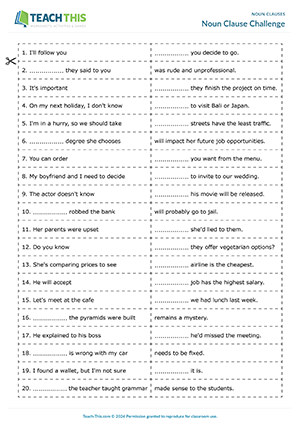In this fun noun clauses game, students listen to sentence pairs and race to change them into single noun clause sentences. In groups, students take turns picking up a card and reading the two sentences at the top of the card, e.g. 'Was he lying?' 'We couldn't tell.' The other students listen and race to create a single noun clause sentence from the two sentences. The first student to say the correct sentence written at the bottom of the card wins and keeps the card, e.g. 'We couldn't tell whether he was lying.' If no one is able to guess the correct sentence, the answer is revealed and the card is removed from the game. The student with the most cards at the end of the game wins.
This comprehensive noun clauses worksheet helps students to become familiar with noun clauses and practice using them in sentences. Students begin by reading about noun clauses. Students then identify noun clauses in sentences by underlining them. Next, students choose the subordinator that best completes each noun clause. After that, students put words in the correct order to create sentences that have noun clauses. Students then move on to match sentence halves together, adding in a subordinator to complete each noun clause. Next, students complete each noun clause with a suitable subordinator. In the last exercise, students complete sentences with their own noun clauses.
Here is a useful noun clauses worksheet for upper-intermediate students. First, students identify noun clauses in sentences and then indicate whether each noun clause acts as a subject, an object, or functions as a compliment. Next, students complete each noun clause sentence with a subordinator from a box. Students then put words in order to make noun clause sentences, adding a suitable subordinator. After that, students combine each pair of sentences to form a sentence that contains a noun clause. Lastly, students match sentence halves together and add a suitable subordinator to complete each sentence.
Here is a free noun clauses board game to help students practice forming and using noun clauses to give noncommittal responses. In the game, students ask questions and score points by forming and using noun clauses to give noncommittal responses. Students take turns rolling the dice and moving their counter along the board. When a student lands on a square that contains a scrambled question, they unscramble the question and ask it to the group members, e.g. 'Who is that?' The other group members then race to form a noncommittal response to the question using one of the sentence frames in the bank and a noun clause. The first student to write an appropriate and grammatically correct response on their paper and say the reply wins, e.g. 'I don't know who that is.' If it is the first time the winner has used that particular sentence frame, they score two points. If the winner has used that sentence frame previously, they score one point. The first student to reach the 'finish' square scores an extra three points and the game ends. The student with the highest score wins.
Here are two engaging noun clause games to help students practice using and forming noun clauses in sentences. First, in pairs, students play a matching game. Students line up sentence beginning cards in order and then take turns picking up a sentence ending card and matching it with the correct beginning card. The first pair to match all the sentences correctly wins. After that, write the missing subordinators from the sentences on the board. Pairs then race to complete each noun clause with an appropriate subordinator. The first pair to complete all the noun clauses correctly wins.
Latest Free
Resources
- The Bus Stop
Getting Around (B1)
Date Added: 1st of October
- Study Skills Showdown
Study Skills (B2)
Date Added: 10th of September
- Everyday Objects Bingo
Everyday Objects (A1-A2)
Date Added: 25th of August
- Action Verb Races
Actions (A1-A2)
Date Added: 18th of August
- Birthday Basics
Birthdays (A1-A2)
Date Added: 8th of August
Latest Member
Resources
- Casual Greetings
Greetings and Introductions (B2)
Date Added: 22nd of October
- Identifying and Clarifying Problems
Dealing with Problems (B2)
Date Added: 22nd of October
- What if we tried...?
Dealing with Problems (B2)
Date Added: 22nd of October
- Suitable Excuses
Making Excuses (B2)
Date Added: 21st of October
- Superlatives Showdown
Superlatives (A1-A2)
Date Added: 21st of October



